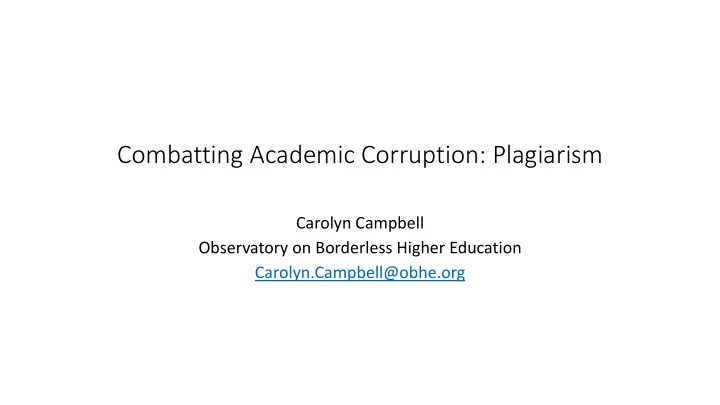

Combatting Academic Corruption: Plagiarism Carolyn Campbell Observatory on Borderless Higher Education Carolyn.Campbell@obhe.org
Plagiarism “an act of copying the ideas or words of another person without giving credit to that person” • not unique to higher education • inadvertent • subconscious • deliberate • contractual
Plagiarism: external quality assurance policy and actions • Expectations and standard setting • Guidance • Investigation • Within review processes • Sector wide • Referral to other stakeholders
External Standards and Expectations: a multinational example European Standards and Guidelines for Quality Assurance (2015) • Internal quality assurance • ESG 1.1 Policy for Quality Assurance - Guidance - quality assurance policy ”supports academic integrity and freedom and is vigilant against academic fraud” • External Quality Assurance • ESG 2.2 Consideration of international quality assurance. “EQA should address the effectiveness of internal quality assurance processes”
External Standards and Expectations: legislative authority - Australia Higher Education Standards Framework (2015) 5. Institutional Quality Assurance 5.2 Academic and Research Integrity – four points for providers • Have policies to promote and uphold academic and research integrity and institutional policies and procedures to address misconduct • Preventative action taken to mitigate risks to academics and research integrity • Students provided with guidance on what constitutes academic research misconduct • Accountability for academic and research integrity is maintained in arrangements with any other party involved in the provision of higher education
What do quality assurance agencies do? • Include academic integrity in standards and policies • UK Quality Code: Expectations A 3.2 and B6 Indicator 14 • HEC Pakistan Plagiarism Policy • Identify and report on issues – at national and provider level • QAA Viewpoint (February 2016) Plagiarism in UK higher education • QAA Plagiarism in Higher Education (August 2016) focusing on custom essay writing services • Guidance for providers – awareness raising and publications • TEQSA Guidance Note: Academic Integrity • Orientation sessions and video conferencing - HEC Pakistan • Supporting and Enhancing the Experience of International Students in the UK – QAA (June 2015)
Internal quality assurance: what do providers do? • Institutional policy and processes on academic integrity for staff and students • Honor codes, Codes of conduct, Academic conduct/misconduct, Academic Integrity • Sanctions • Work with students and staff to avoid plagiarism • Induction processes • Use both formative and punitive of plagiarism detection software tools • Develop ‘robust and varied assessments to make deliberate plagiarism difficult’ But is a stronger focus on the transparency, consistency and fairness of the assessment of student learning across and within institutions necessary in quality assurance both internal and external?
What works? The number of students caught cheating at universities in Wales rose 50% over a three year period to 2014 A student union view was that: “Don’t believe it is a new trend, cases of student misconduct have sadly always existed” “What has developed over recent years is a much more coordinated approach to monitoring and online submission tools that pick up any irregularities and causes for concern.” www.dailypost.co.uk
From punitive and negative to positive and educative approaches “Training and awareness are key. While it may be accepted wisdom and practice that one should not plagiarise, to punish without ensuring awareness is a failing of the system rather than of the student” Christopher Hill “ Knowledge Creators or Knowledge Hijackers? Plagiarism in International Education” – OBHE News Analysis, February 2017 www.obhe.org
Resources and acknowledgements http://aisp.apfei.edu.au/content/academic-integrity-policies.html www.enqa.eu https://www.legislation.gov.au www.teqsa.gov.au www.qaa.ac.uk www.obhe.org IPPHEAE – Impact of policies for Plagiarism in Higher Education Across Europe www.plagiarism.org www.hec.gov.pk www.chea.org Best Practice Strategies to Promote Academic Integrity in Online Education (2009) WCET, UT Telecampus of University of Texas System and Instructional Technology Council
Recommend
More recommend